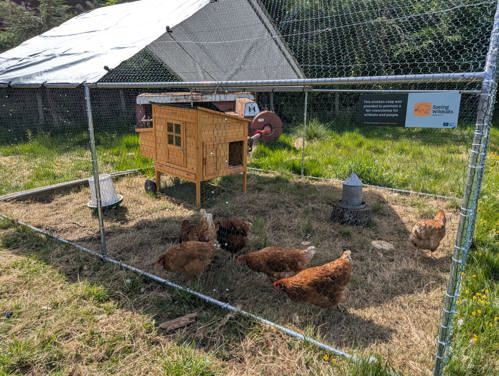Photo credit | Guy Roberts
Wildcats and predation of domestic poultry
Since wildcats were first released into the Cairngorms National Park in the summer of 2023 there have been confirmed instances of chicken predation, to the understandable dismay of affected owners. Although wildcats are part of a functioning and healthy ecosystem, they may not have been present in the landscape for some time due to decades of lethal predator control. This guidance is designed to assist domestic poultry keepers to live alongside wildcats and other predators. Please also see the NatureScot Wildcat legislation note for keepers of gamebird pens and poultry for further relevant information.
Preventing predation of domestic poultry
Wildcats are opportunistic predators, and although chickens do not form part of their natural diet, individual wildcats have been known to kill and eat chickens if they are available. Once a wildcat finds an easy food source, it is unlikely to move on while food is still available, so it is important to act quickly if you suspect a wildcat has predated one of your chickens. As described below, predation can be prevented in most circumstances using appropriate husbandry techniques.
The Vincent Wildlife Trust have produced a leaflet with detailed guidance on ‘How to exclude pine martens from game and poultry pens’, and these measures will also be effective for wildcats. The leaflet is available to download here, and the key points summarised below.
Measures that are effective at protecting poultry from more common predators such as pine martens, foxes and stoats will also keep them safe from wildcats. Pine martens can squeeze through a hole of about 45 mm in diameter, much smaller than a wildcat could enter, although any predator may access hen houses by enlarging a hole in rotten wood. Therefore, rotten wood should be replaced and any holes in the hen house must be smaller than 45 mm in diameter.
Hen house doors should be closed during the hours of darkness and the door should be secured to prevent it being lifted by a predator. Devices are commercially available that are sensitive to light levels and automatically open and shut hen house entrances accordingly.

An example of an effective chicken coop, built by a resident protecting their poultry from predation
Wildcats may be more active during the day than some other predators (although pine martens are also more diurnal in the summer months). Therefore ideally daytime chicken runs should be secure and roofed with wire mesh to keep out wildcats along with avian predators such as buzzards.
If free-roaming chickens have been predated and a wildcat is suspected, the chickens should be kept inside a predator-proof enclosure for at least a few days until the wildcat has moved on.
Camera-traps can be used around the outside of the enclosure to determine the presence or absence of different predator species. Wildcats will only utilise a food source while it is freely available, so once access to the chickens is withdrawn, the wildcat will search for food elsewhere.
Free ranging hens are vulnerable to a wide range of predators. If chickens are not kept inside a secure run, they are vulnerable to predation from a range of species, including foxes, stoats, badgers and pine martens, not just wildcats.
A local resident in the area wildcats were released into has said the following about poultry predation, 'When the first of the wildcats were released into our area, we realised quickly that we would need to take measures to protect our chickens. We firstly covered our walk-in chicken run with pheasant pen netting to make the run fully enclosed. We then added a number of solar powered animal scarers around the outside of the run which flash light and emit a high pitch sound in response to movement. We are very pleased to say that as a result, all our chickens are safe and secure from the wildcats that have now settled in the area.'
Chicken predation prevention trial
Saving Wildcats is working with local residents directly affected by predation of backyard poultry by released wildcats. The team is keen to support domestic poultry keepers and can offer advice on how to better protect their poultry from potential predation.
In addition to this, a few stakeholders are currently trialling the loan of predator-proof coops and runs provided by Saving Wildcats. The team provide and construct the coops and runs, which will then be followed by a period of monitoring using trail cameras to ensure they’re providing effective protection.
Saving Wildcats is also working with local farmers and small holders to help construct and provide financial support towards the upgrade of larger coops or runs that have been affected during this transition phase, as wildcats once again become part of the natural landscape. We have been trailing a range of designs including designs that don’t require electricity or covered tops.
At the end of this trial scheme, Saving Wildcats will compile the information gathered and share the results, focusing on the effectiveness of these mitigation techniques.

Enclosed chicken coop provided by Saving Wildcats to help protect the birds from predation
If you would like more information, or you have been affected by wildcat predation, please get in touch via email at wildcats@rzss.org.uk
Other useful information
-
Wildcats and legal protection
Wildcats are protected by law, and it is an offence to trap, transport or relocate a wildcat without a licence. If you trap a wildcat accidentally you should release it immediately where it was trapped and contact LICENSING@nature.scot via email. Further guidance on accidental wildcat trapping is available here. -
Avian Influenza and the Scottish Kept Birds Register (SKBR)
From 1 December 2024, all poultry keepers (and anyone that keeps birds, even just a single bird) will be legally required to register their birds on the Scottish Kept Birds Register (SKBR). You can find out more about this here.

